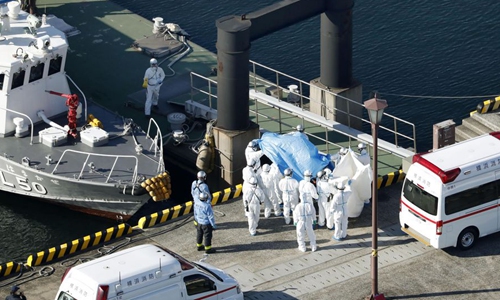HOME >> OPINION
China can reciprocate Japan’s help with experiences, information
By Chen Yang Source:Global Times Published: 2020/2/19 14:30:18

Epidemic prevention personnel transfer confirmed patients infected with the novel coronavirus on the "Diamond Princess," a cruise ship which has been kept in quarantine, to an ambulance on the port of Yokohama in Japan, Feb. 5, 2020. (Kyodo News via Xinhua)
The Japanese Ministry of Health, Labor and Welfare on Tuesday confirmed 88 more cases of people infected with the novel coronavirus (COVID-19) on the Diamond Princess cruise ship, bringing the total to 542.
According to a report by the Japan Times, at least 616 people have tested positive for the virus in Japan, including 542 from the ship and eight other new reported cases across the nation on Tuesday.
With the spread of COVID-19 worldwide, Japan has become the second most infected country after China, and the impact of the epidemic on Japan is gradually emerging. The outbreak of COVID-19 has seen public places and visitor attractions in Japan step up disinfection measures, however, the COVID-19's incubation period and infectivity means that Japan's current prevention network may be insufficient to effectively curb the epidemic's spread.
In fact, some companies in Japan have started asking employees to work from home and supplies of face masks and medical alcohol are running low. This shows that Japanese society lacks confidence in the government's current measures. A more serious issue is that if the COVID-19 spreads quickly in Japan, there may not be enough hospital beds to cope.
During China's fight against the COVID-19, the Japanese government and society have supported China. Japan has donated many epidemic prevention materials such as face masks and protective clothing, which has touched many Chinese people. Now Japan is facing the challenge of the COVID-19 and although China is still at the forefront of fighting the epidemic, it has the duty to provide support for Japan.
This is not only the Chinese people's return of Japan's heartwarming supports, but also a reflection of traditional Chinese virtue. Given that the domestic epidemic situation in China is still tense, it may seem difficult for China to donate masks to Japan and send doctors. However, we should provide as much help as we can to jointly fight the virus.
On the one hand, China can share COVID-19 information, experience and lessons with Japan. China was the first to deal with the epidemic. For example, China shared the genetic sequence of the novel coronavirus with the World Health Organization on January 12, providing help for the international community and scientists worldwide to carry out research on the virus and develop diagnostic reagents and vaccines.
At present, Chinese scientists have also made positive progress in researching drugs and clinical treatment of the virus. Therefore, China can proactively share its latest findings with Japan to help it effectively respond to the epidemic and achieve early detection and treatment.
Some large-scale activities in Japan still have not been suspended despite the increase in the number of infected people. It is necessary for Chinese experts to warn Japan. After all, Wuhan did not halt some large-scale public activities in the early stages of the epidemic, which partly caused the rapid spread of the COVID-19 in China. Japan should not make the same mistake.
China can also introduce its successful measures to Japan for reference, such as mobilizing multiple provinces and cities to provide support, the central government's deployment and coordination and isolation of each community to block the epidemic's spread.
On the other hand, China should restore normal social and economic order as soon as possible, which is also a huge help to Japan. According to the Japanese Ministry of Economy, Trade and Industry, about 70 percent of Japan's face masks are imported from China and the remaining 30 percent are produced locally. Because of the epidemic, China's mask production and logistics have been impacted, as have masks exported to Japan. Thus, there has been a shortage of face masks in both China and Japan.
Because of the epidemic, some Chinese companies that supply parts to Japan and Japanese companies in China have ceased production, and thus many of Japan's domestic companies also have to suspend production.
Japan's Daiwa Institute of Research estimated in February that the epidemic could cause Japan's national GDP to shrink by 0.2 percent if it takes three months for the COVID-19 to subside. Therefore, in the non-key epidemic areas in China, the restoration of normal social and economic order helps both Chinese and Japanese enterprises.
It is hoped that China and Japan can strengthen cooperation in epidemic prevention, jointly safeguard the two people's lives and health and maintain public health security.
The author is a media professional and an observer of Japan issues. opinion@globaltimes.com.cn
Posted in: ASIAN REVIEW